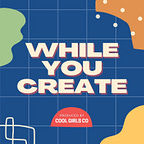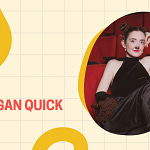What makes starting so difficult? In this episode, we talk to psychotherapist Vi Dong (@problematicfave) and filmmaker Cassidy Civiero (@casscivi) on mental and creative blocks. We also touch on the importance of checking in on each other’s wellbeing as a creative community.
___________
Cassidy Civiero is a Canadian filmmaker and activist with a focus on content that deals with climate change, late-stage capitalism, and gender/sexuality. He is a screenwriter and associate producer for the show You’re My Hero (2023, CBC Gem). His directorial debut, I’m in Love with All My Friends (2014) achieved international distribution through the Fearless app. Cassidy has been selected for the 2023 Voices with Impact cohort for his next project Ethical Consumption (2023) and awarded the associated grant to make his vision come to life. When not working in film, you can find him tending to his garden or fervently coddling his dog, Charlie.
This episode's musical guest is Elise Go. She is a recording artist and songwriter from San Francisco, CA. She was a classically trained pianist from the San Francisco Conservatory of Music. With her exemplary background in music, Elise was the second place winner of ETTV’s Top Idol in 2011 at age 16. She continued her musical journey, finishing in 7th place on Million Star, a prominent reality singing competition in Taiwan. In 2017, Elise graduated cum laude from Berklee College of Music with a BA in Songwriting. During her time at Berklee, Elise performed in various shows at the Berklee Performance Center, Boston Symphony Hall, and other notable venues. Among these performances, Elise opened for international Chinese Pop superstar, Lee Hom Wang in November 2016. In recognition of her outstanding musicianship, Elise was awarded the Berklee Songwriting Achievement Scholarship. She also was selected as a soloist to perform at the Berklee Commencement Concert for the Class of 2017. In 2020, Elise was cast as Pop Princess on FOX’s new music game show, I Can See Your Voice, hosted and executive-produced by Ken Jeong. Her music and sound are influenced by a mix of R&B/Soul artists of yesteryear, paired with a fresh take on the current pop scope. Collaborators include Benji Cormack (slenderbodies) and Johannes Gritschacher, Olivia O’Brien’s drummer.
Adreyauna from Ink to Prosperity (@inktoprosperity) hosts a body break.
WHILE YOU CREATE is an audio show brought to you by Cool Girls Collective — we’re a community shaping convos around creativity. You can find us at coolgirls.co and on socials @coolgirlscollective. Production music is by LoHi5 (@lohi.5.music).
Episode Transcript
Ruth: We've all been there. A day when you get a rush of new ideas, so you quickly grab a clean painting brush. Break the seal of a new package of clay. Crack open your laptop. The words flow freely from your fingertips as you type your soon-to-be best-selling novel. Or the image in your head effortlessly becomes a photo taken by your camera. This is how masterpieces are born... Or is it? What about the days where you don't have good ideas? When you have zero motivation? When you try all day but somehow you feel like you got nothing accomplished? And what about those days where everything is a distraction?
Cassidy: There was a time where I first started using TikTok where I was like working and using TikTok at the same time and it was like, okay, I needed to really create a balance there.
Ruth: That was filmmaker Cassidy Civiero and just like them, we've all been there. So I got to ask from a creative to other creatives: why is it so freakin' hard to start? You know the drill. Before we jump into the story, we're taking a quick pause to breathe. Here's Adreyauna from Ink to Prosperity with a moment of meditation.
[Music]
Adreyauna: Hey you, it's time for a body break. Put down the pencils, step away from the screen if you can. And let's just take a moment to be here. Let's relieve some tension by stretching our bodies, good. And then we're also just going to rub our bellies. So just rub gently softly and this is going to help you with your breathing, especially if you tend to hold your breath a lot while you work. Good. And now we're actually going to take those breaths. So go ahead and take a deep breath in and let it out. Thanks for joining me.
Ruth: Now, back to the story. What makes starting so difficult? I am so taken by this question on a daily basis that I went as far as asking a therapist. Yes, really. I went there. Here's what Vi Dong, a psychotherapist who works at a community mental health clinic in New York City, had to say
Vi: So I work with lots of people who do not talk about mental block, but they talk a lot about the lack of motivation and that's something I made the connection to. And I have friends and also clients who work in the creative field that I think they struggle with this a lot. It could be so many things. It could have to do a lot with just what's going on on a day-to-day basis. Maybe some emotional turmoil. Just long-term stress. Repression of just how it isn't working for you. I think the online definition is like a form of inability to access motivation, creativity, and productivity. It's problematic the way that it's defined as this is a problem within you, within your own function. Because I think it's coded very negatively without much context of why it's going on for this person at this specific time. Motivation,
productivity, and creativity are all finite resources. So it's very difficult to identify because every creative works differently.
Ruth: Let's take a moment to break this down. As an artist or creative, you probably have a specific way of working. You might be someone who has a structure or routine. You work at certain hours every day at an office or a studio. Or you're the total opposite. You work only when creativity strikes and that might be in the middle of the night sometimes. More likely you're someone in between. Take Cassidy for example, who works as a writer for a Canadian episodic series. Cassidy doesn't necessarily have a job where they can just leave work at work. They may be writing at home, but their career also affords flexibility within their schedule. Here's Cassidy now.
Cassidy: I really don't structure my life at all. It's like, now I have a dog. So it's very much like you wake up, you take the dog out, you feed the dog. That's as far as my structure really goes, unless you know, I'm doing a writer's room for my show. It's like, okay, if it's this day at this time, so it's not a totally unstructured situation. Sometimes I have to slot stuff in. But for the most part, it's like, okay, wake up. Once I'm like fed and have my ice coffee, then you can kind of just decide what to do first.
Ruth: But when society measures success as a certain level of productivity, it becomes hard not to dedicate every second of your day to working on your craft, especially when you start comparing your productivity to someone else's output.
Vi: I think it's something that is learned once you're conscious of what the system looks like. We are such social creatures that conformity will always be something that influences how we create things. We give into social pressure a lot. And it shows up in many ways that are not as conscious. It's very much conditioned in us from childhood. It's very much embedded in a lot of societies and feeling like we must work harder to deserve more.
Ruth: Now, take this icky feeling society has ingrained in us of not doing enough and add expectations from your boss, your parents, or the need to put food on the table, and you've got a recipe for burnout. One of the many obstacles that prevents us from creating new work.
Vi: I think some of the basics still apply is that doesn't change the fact that our motivation and our creativity and our product is finite. You know, like the creative juices can only run so long until you're like I have had enough of that. I need a change.
Ruth: In Cassidy's case, it's the trust they have in themselves and their career that keeps them going.
Cassidy: I used to struggle with this a lot, working 24/7 all the time. Now,
I just kind of trust that I'm going to do everything I need to do and it has not failed me thus far. But I do less now than I did in previous years and I hustle less and everything still gets done. So the way that my kind of income and my life is structured, it's not very much like, oh, this one hour work is worth this amount of dollars and I have to do this amount of hours of work in a day and a week and a month in order to meet these expenses. It's just kind of like, okay, I have this project. I'm getting this chunk of money for it and I got to trust that I have another project coming through and I'm getting another chunk of money and I'm just going to tackle that first project while I have time to do it before the second one comes in. So it's very, it's a lot about trust in myself and my colleagues and my financial wellbeing. There's a lot of trust going on that it'll all work out.
Vi: And it's important to take note of what you're thinking and how you're feeling and to acknowledge and normalize those feelings rather than fight against them. It's important to be kind for yourself no matter like what stage you're at in the creative process. You don't want to further the cycle of pain, right? Now, so if you're shifting into wanting to be more sustainable and be more kind to yourself, that may mean you are less productive and it's okay if you're less productive because a lot of those goals can be compromised. They can be negotiated because it might just be with yourself.
Ruth: So this is one reason for mental or creative blocks. It doesn't necessarily start with us. It's decades of reinforcement from corporate workplaces and hustle culture that has led us to dissatisfaction with our work or the way we're working. We then have to confront this issue and redesign a more sustainable approach.
And that probably looks different for each of us. It might mean quitting a full time job and going freelance. Or spacing out projects for longer intervals of time. Or even taking more mental health breaks where you just completely unplug from everything. But what about creativity that's not necessarily for profit? The ideas and dreams we have outside of our jobs? What about our passion projects Speaking of passion projects, we've got something special for you. In this episode, we're highlighting singer songwriter Elise Go and her debut album "Phases." Here's Elise on her track called "Phase."
Elise: I love this podcast episode title. Why is it so hard to start because I can really relate to it, especially during the making of my debut album "Phases." The next song you're about to hear titled "Phase" is actually a song that I wrote in 2019. So it took me a really good amount of time to actually produce the song out and get it to the place that you hear it now. This song specifically was a song that I really had trouble finishing because it was so hard to write initially. "Phase" I wrote when I was in a really, really difficult time in my life. I had just gone through my first major heartbreak and I was pretty depressed when I moved to LA. I wrote this song sort of as a really vulnerable journal entry and personal love letter, letting myself know that I would be okay even if I wasn't at the time.
[Music]
Ruth: For Cassidy, the process of writing for personal projects is not so different from their paid work.
Cassidy: My passion projects is definitely some similar issues and some similar blocks of like there's too much going on here, you're trying to say too much within an hour and a half is like my main issue. And sometimes I look at it and I'm like, oh there's so much good stuff, but it's so messy that I don't even know where to start. So that's like a big block for my passion projects. I've never encountered that situation where it was more riding on it other than just this is my own project and we'll just see. I do definitely believe in the power of creating an environment in which you can work. So it's like, I want to make sure I have a beverage I need and my desk is clean and my laptop is on my desk. And during the day I write better when there's like some natural light coming at me. So I do set up circumstances to help enhance the experience so that I can push through any blocks I may have.
Vi: The human body is very intuitive in the things that it needs and that it wants,
and it's important for us to honor those signals. So if you're used to a very structured schedule, it can really throw off your natural signals. And a lot of other conditions are a result of that, like you've become misaligned with your own body, so you work through the natural signals that your body is giving you to try to do more. I don't like to answer questions with other questions. But in this case, I think it's good to ask yourself, what is this block doing for me? Why do I feel like I just don't know what to do now? Is it because I'm tired? Is there something that I'm afraid of if I finish this? Is it because if I finish this now, I have to think about another project? Like if I don't do any project, I'm not productive and I don't like to be unproductive because you always have to be productive and prove your artistic value by always doing work can also be a very toxic cycle of not really listening to what your body needs.
Ruth: And yet the process of creating, of putting our minds and body to work, doesn't have to be toxic. What really matters is finding that balance between what others need from us and what we need for ourselves. It's easier said than done but there are little things we can do to get closer to this harmony.
Cassidy: I think a recurring theme for me and my creativity is definitely like I want to be able to create more for myself and it is very hard when we live in a society where it's all about monetizing everything and everything becoming a product and I am a product and yada yada yada. It is very hard sometimes to do like art therapy. I very much believe in the power of art therapy and sitting down and collaging or like drawing, writing a poem for yourself. I really want to make space in my life for art that is not a product.
Vi: When I think about creatives that like a lot of you face just so much criticism, it's very few that I hear that people get praise for the work that they're doing right, that like, wow, this is cool. But they're always like, oh what's the next big thing you're doing? You know, or like what are you doing after? Like can't this just be my thing and like nothing else happens, right? And I think it's okay to verbalize that. You could just say, I don't know, I don't know what I want to do. I want to just be in the moment and appreciate this for myself, right? You don't have to answer those questions.
Cassidy: I have one amazing friend who, whenever we get together, we just get in the zone for six hours, just crafting in silence together. And I really want to harness that power and be able to do that alone even at least once a week for myself because once your passion becomes your career, it's a very blurry line of becoming a workaholic and all of your art becoming for money. And I just would really like to be able to separate that out a little bit.
Ruth: I can definitely relate to what Cassidy is saying here. Before Cool Girls Collective, I was meeting regularly with a group of friends to make art. We had no deadlines or end goals, just a list of projects we've always dreamed of doing. We would get together every few weeks to offer feedback or just vent about life. And then when the collective was born, we grew to include artists and creators from all over the world. This kind of community, and I mean a true community, one that checks in on each other beyond just productivity checks is what the collective is built on. It's what makes the journey of being an artist less lonely and daunting.
Vi: I think as a community it's helpful to be, I don't know how it is currently, to be vulnerable with each other, right? Just like, yeah, I'm struggling with like this and that. And ironically remove the focus on let's help each other be more creative, let's just, you know, help each other relax. Have time to do things to bond over topics that are not currently things you already have in common, right? So kind of like humanizing the field again. And being like, oh, well everyone kind of struggles with this instead of, oh, I just assumed everyone just had endless ideas and they were like every morning, they go, oh a new project, but I did it by the end of the day and I'm not tired. So I think it's very important to honor and look back that, wow, this is a huge accomplishment for me. To take time for yourself to celebrate the things you are able to accomplish rather than always looking for the next goal post. Because it will be really hard to feel successful, right? And I guess a question to ask yourself is am I doing this in order to just meet demands or do I actually want to feel happy? Do I want to feel fulfilled? Do I want to feel successful? And is what I'm doing, doing that for me?
Ruth: You heard it. Let's celebrate the little Ws just as much as the big ones. Let's normalize not getting anything done sometimes. Let's hype each other up with the notion that creativity is not linear. And if we're all in agreement, then those creative blocks? They're just part of the process.
Elise: Good Company. I'm really excited to share this song. I wrote it with a very specific image in mind and I basically painted the picture through the song. I found myself, after I just moved to LA, going to a lot of parties that I actually didn't want to go to with people I didn't really want to see. And I yearned to find those true friends, those genuine connections, that real good company. And so I wrote this song welcoming anybody that is down for a good time and good vibe to join me and to be in good company.
[Music]
Ruth: And that's it for our episode. Cassidy Civiero is a Canadian filmmaker. You can find them via the website at Cassidy Civiero dot com or on Tiktok at casscivi. That's C A S S C I V I. Vi Dong is a psychotherapist working and learning in New York City. You can find her on instagram at problematicfave. Our featured music is by Eliseo Go from her debut album, "Phases." The track "Phase" was written by Benji Cormack, Chloe Low, and Elise Go and produced by Elise Go. "Good Company" was written by Elise Go and produced by Elise Go and Belinda Huang. You can follow her on Instagram and TikTok at N I H A O E L I S E. That's nihaoelise. "Phases" is out now on Spotify. Go check it out. It is such a special album. Special thanks to Adreyauna at Ink to Prosperity. Ink to Prosperity a space that provides personal & career development from a spiritual perspective. You can learn more at ink to prosperity. That's I N K T O prosperity dot com or give her a follow on Instagram at inktoprosperity. While You Create is an audio show brought to you by Cool Girls Collective, we're community shaping convos around creativity. You can find us at Cool Girls dot co. And on instagram at coolgirlscollective. Production music is by LoHi5. You can listen more on Instagram at LoHi the number five dot music. I'm your host Ruth and I'll see you next time.











